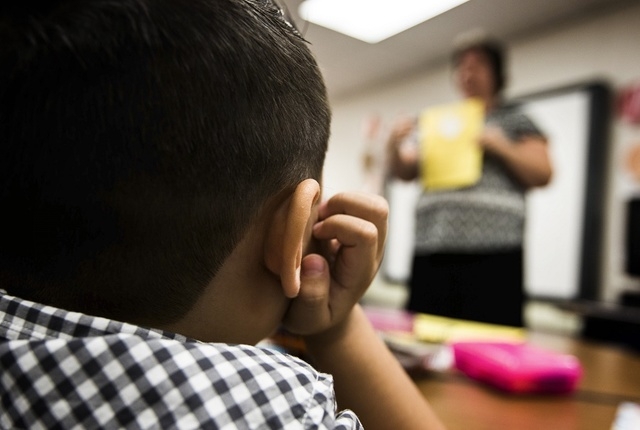UNLV study connects full-day kindergarten to better health, achievement
Full-day kindergarten may be a gateway to higher academic achievement and improved health for Nevada’s youth, according to a recent study from UNLV’s School of Community Health Sciences.
The study was released May 22, shortly after state lawmakers approved $2.2 billion in K-12 education funding. About $36.5 million will go to expanding full-day kindergarten to every public school in Nevada.
The research is based on data from 2010 to 2014 gathered by UNLV researchers, who began work in October 2014. Sources included the U.S. Department of Education and the Bureau of Labor Statistics. The team also surveyed parents and community members through organizations such as the PTA, with responses showing strong support for full-day kindergarten.
The research team found that students in full-day kindergarten score better on tests than their half-day counterparts. It added that this could lead to improvement in Nevada’s high school graduation rate.
The work was funded by the Health Impact Project, which is a collaboration of the Robert Wood Johnson Foundation and The Pew Charitable Trusts. Team partners included the Southern Nevada Health District.
Research team member Courtney Coughenour, an assistant professor in public health courses at UNLV, hopes exploration of the relationship between full-day kindergarten and health captures the attention of state lawmakers.
“The health impact assessment is basically a tool to help those who make policies, regardless of whatever sector it might be — in our case it was education — to sort of, hopefully, realize the impact that these non-health decisions can have on health,” she said in late June.
The research also can inform “potential future decisions when they’re making policies.”
The study included recommendations based on their results.
Because research shows that giving children information about nutrition early in life can have a positive effect on their attitudes later, the team suggested schools provide professional workshops to kindergarten teachers to improve their nutrition education strategies. It also recommended free universal meals for all kindergartners to ensure they receive proper nutrition.
The report also found data showed that receiving a diploma increases the chances that a student will have a positive future. Improved educational attainment leads to a better socioeconomic standing, according to data from the Bureau of Labor Statistics. Higher incomes also mean better access to health resources as well as health insurance.
In 2012-13, Nevada’s average four-year graduation rate was 71 percent. The national average was 81 percent, according to the U.S. Department of Education.
“A lot of education decisions will eventually impact health both in the short term and in the long term,” said Coughenour. “We know people who are better educated live longer, healthier lives, they’re less likely to smoke, they’re more physically active, they’re more likely to graduate high school and be employed. So there’s lots of links there to health.”
The study also indicated that being in kindergarten promotes early detection of hearing and vision problems through school-provided screenings. Catching these issues can lead to “improved academic achievement.”
“It wasn’t that surprising to see some of those connections,” said Mark Gakh, a research team member and resident scholar at UNLV. “But it was really interesting to try to apply those concepts and those ideas to Nevada locally.”
Attending kindergarten is not mandatory in Nevada. Children can skip it as long as they pass a developmental screening test prior to enrolling in first grade. According to the Nevada Department of Education, 2,124 children in the state are not enrolled in kindergarten.
“I think just seeing some of our statistics in Nevada — the low-income populations, children who don’t have access to pre-K and those populations that are most at-risk and the number of them who aren’t accessing some of the services that are potentially available to them — was a little bit shocking,” Coughenour said.
Full-day kindergarten is available to 87 percent of Nevada students. It’s offered in 150 of the 222 schools in the Clark County School District, 42 of which charge a $3,100 tuition fee for the school year.
Free, full-day classes will be expanded to every public school in the state by the end of 2017 through Gov. Brian Sandoval’s recently approved education reform measures.
Danielle Miller, assistant superintendent of CCSD’s instructional design and professional learning division, believes the full-day classes help students retain what they learn.
“What we see in the full-day is that the children have three more hours to (build their social skills) and to learn about things and actually apply their skills in reading, writing, listening and speaking,” Miller said.
Gakh said the team’s goal in pursuing the study was to provide the public with important information and to demonstrate how health is relevant in several areas.
“I think it’s really important just to be thinking about the interconnection between different ideas,” Gakh said. “I think it’s important for the community to be aware that there really are those connections between education and health.”
Contact Las Vegas Review-Journal writer May Ortega at 702-387-2908. Find her on Twitter @MayVOrtega.

















